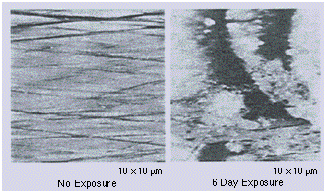


| Home Page |
| Publications |
| Newsletters |
| Announcements |
| Cortec Connection |
| Cortec Connection Spring 2001 |
|
|||
University of Maryland StudyVpCI's Protect Computer Hard Drives
Current magnetic data storage systems are high performance devices that require controlled operating environments. This becomes exceptionally challenging for systems exposed to marine environments where harsh temperature and humidity conditions accelerate corrosion in the metallic parts of the system. To solve this problem, many methods (protective coatings, alloying with other metals to increase its resistance to corrosion) for protecting metals and alloys from atmospheric attack have been developed An effective and relatively inexpensive method for corrosion protection consists of using VCIs. These are chemical compounds, that when added to the ambient in small concentrations or used to coat a metallic part, should restrain corrosion by reducing or preventing the reaction of the metal with the environment. Although the exact mechanism through which this occurs is not clear, it is sustained that the VpCI® molecules react with the moisture in the ambient forming a thin protective film on the surface . While the efficacy of VpCI®'s has been evaluated in electronic systems, many uncertainties remain as far as their potential effects on magnetic data storage systems. It is therefore necessary and important to evaluate the efficacy of VpCI®'s in protecting magnetic and topographical features of magnetic recording media from deterioration in saltwater high temperature/humidity environments. The choice and incorporation of an effective and optimal form of corrosion protection method in the magnetic data storage systems in selected ships will result in reduction of their maintenance costs, optimizing their performance, and increasing their life cycle. This was achieved by comparing the evolution of a disk's morphology and magnetic signals when exposed to harsh environmental conditions with and without a VpCI®. These conditions were measured in temperature and humidity originated from a 3.5% saltwater solution, in an attempt to simulate marine environments. It was observed that one of the major mechanisms of deterioration present after any degree of exposure was the formation of a residue layer on the disk surface. The removal of this layer was essential for successful spin stand reading and data retrieval. Other effects caused by exposure to high temperature and humidity were signal reduction, and increased noise and pulse distortion. These effects were measured through standard spin stand test. The inclusion of a VpCI® seemed to reduce the formation of the residue layer and the spin stand test results support this view.
|
|||
[About Cortec] [What's New] [Publications] [Products] [Contact Us] [Related Links] [International]
Cortec® and VpCI® are registered to Cortec Corporation
 In
a breakthrough study performed by Romel Gomez and Sylvia Florez
of the Department of Electrical Engineering, University of Maryland
for the U.S. Naval Surface Warfare Center. The purpose of the study
was to measure the effects Cortec Volatile Corrosion Inhibitors
(VpCI®'s) on the performance of magnetic data storage rigid
. The following are actual excerpts from the findings.
In
a breakthrough study performed by Romel Gomez and Sylvia Florez
of the Department of Electrical Engineering, University of Maryland
for the U.S. Naval Surface Warfare Center. The purpose of the study
was to measure the effects Cortec Volatile Corrosion Inhibitors
(VpCI®'s) on the performance of magnetic data storage rigid
. The following are actual excerpts from the findings.